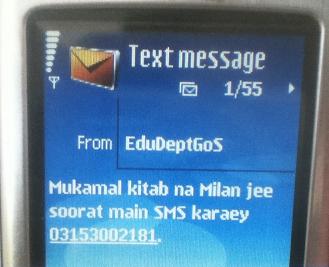 In the classic Ernest Hemingway novel The Sun Also Rises, Scottish war veteran Mike Campbell is asked how he went bankrupt. His answer: "Two ways. Gradually and then suddenly."
In the classic Ernest Hemingway novel The Sun Also Rises, Scottish war veteran Mike Campbell is asked how he went bankrupt. His answer: "Two ways. Gradually and then suddenly."
This pithy response is in many regards an accurate description of how the World Bank has considered of the use of mobile technologies as part of its support for international development efforts over the past decade. As part of its 'Innovation Days' event this week, the World Bank showcasing new approaches to some long-standing development challenges. Judging by many of the exhibits and discussions going on related to the use of mobile phones, it is clear that what was for a number of years a rather fringe topic of conversation among small pockets of people here -- primarily those working in the ICT sector and on microfinance -- has now exploded into the consciousness of World Bank and other international donor staff working in most sectors.
(It is perhaps no coincidence that the first person named as a 'World Bank Fellow' -- a global program announced earlier this year to tap new expertise into the World Bank's development work and strengthen its knowledge network -- is Michael Joseph, the former CEO of Safaricom, which has pioneered the use of 'mobile money' in East Africa through its popular m-Pesa program.)
A number of mobile phone-themed projects are being profiled as part of Innovation Days, including the use of mobile phones for real time data collection to support conditional cash transfer (CCT) programs in Latin America, to strengthen the supply chain for lifesaving drugs in Zambia as well as to improve both public services in Pakistan and farmers' risk mitigation in India. A few months ago the World Bank EduTech blog profiled some uses of SMS in education in the Pakistani province of Punjab. Uses of text messaging in the education sector in the neighboring province of Sindh are being showcased at Innovation Days this week as well, and what is happening in southern Pakistan is in many ways representative of approaches and activities increasingly in evidence all over the world.
The "SMS for Better Schooling in Sindh" initiative is seeking to build bridges between government, schools and local communities as part of a wider effort to improve education services delivery. 400 schools are involved in an initial pilot project, which is utilizing text messages to inform schools and communities about things like the planned delivery of new textbooks -- and to check in to make sure that the textbooks have actually arrived and are in use. A number of other services are being monitored as well, including the state of lighting in classsrooms and the quality of drinking water in schools. These sorts of things may not appear to be 'groundbreaking stuff', but, by raising awareness among local communities and different levels of the education system about their roles and rights, and by having government officials quickly exchange information back-and-forth with citizens on a variety of administrative matters via SMS, the project is seen to represent a significant improvement from past practices which, in the words of the project sponsors, were "characterized by virtually no direct information exchange".
As with the SMS education project in Punjab, this initiative in Sindh is taking advantage of the low costs of text messaging and the high penetration of mobile phones in local communities in an attempt to connect citizens with government in new ways as a way to improve the delivery of basic education services at the grassroots level.
Connecting people involved these sorts of initiatives is one of the goals of the newly announced Mobiles for Education for Development (m4Ed4Dev) Alliance, an international collaborative effort in which the World Bank participates between bilateral and multilateral donors, NGOs, foundations, private sector partners, academic researchers, and implementing organizations that is working "to explore cutting edge intersections between mobiles, education and development and to promote collective knowledge sharing". Following up on its successful research roundtable at Stanford University earlier this year, in August USAID will be hosting an event in Washington, DC (supported by the World Bank and many other partners) as part of its leadership work with the Alliance around the theme of "Promoting Quality Educational Outcomes through Mobile Technology" (more information here). It is hoped that events like these will not only showcase promising practices in current projects, pilots and evaluations, highlighting initiatives from around the world that are largely occuring 'under the radar', but also inspire future innovation by bringing together representatives from innovative projects with potential funders and by catalyzing research to help inform current and future practices in this fast-moving field.
Note: The images used in this blog post come courtesy of the World Bank team working on the "SMS for Better Schooling in Sindh" initiative and are used by permission.



Join the Conversation